Kunstformen der Natur

Kunstformen der Natur (known in English as Art Forms in Nature) is a book of lithographic and halftone prints by German biologist Ernst Haeckel.
Publication
Originally published in sets of ten between 1899 and 1904 and collectively in two volumes in 1904,[2] it consists of 100 prints of various organisms, many of which were first described by Haeckel himself. Over the course of his career, over 1000 engravings were produced based on Haeckel's sketches and watercolors; many of the best of these were chosen for Kunstformen der Natur, translated from sketch to print by lithographer Adolf Giltsch.[3]
A second edition of Kunstformen, containing only 30 prints, was produced in 1924.
Themes
According to Haeckel scholar Olaf Breidbach, the work was "not just a book of illustrations but also the summation of his view of the world." The over-riding themes of the Kunstformen plates are symmetry and organization. The subjects were selected to embody organization, from the scale patterns of boxfishes to the spirals of ammonites to the perfect symmetries of jellies and microorganisms, while images composing each plate are arranged for maximum visual impact.[4]
Among the notable prints are numerous radiolarians, which Haeckel helped to popularize among amateur microscopists; at least one example is found in almost every set of 10. Cnidaria also feature prominently throughout the book, including sea anemones as well as Siphonophorae, Semaeostomeae, and other medusae. The first set included Desmonema annasethe (now Cyanea annasethe), a particularly striking jellyfish that Haeckel observed and described shortly after the death of his wife Anna Sethe.[1]
Influence
Kunstformen der Natur was influential in early 20th-century art, architecture, and design, bridging the gap between science and art. In particular, many artists associated with Art Nouveau were influenced by Haeckel's images, including René Binet, Karl Blossfeldt, Hans Christiansen, and Émile Gallé. One prominent example is the Amsterdam Commodities Exchange designed by Hendrik Petrus Berlage: it was in part inspired by Kunstformen illustrations.[5]
Gallery of prints
Haeckel's original classifications appear in italics.
-

Sea anemone (Actiniae)
-

Anthomedusa (Anthomedusae)
-

Antelope (Antilopina)
-

Arachnid (Arachnida)
-

Ascidian (Ascidiae)
-

Frog (Batrachia)
-

Turtle (Chelonia)
-

Ciliate (Ciliata)
-

Annelid (Chaetopoda)
-

Bat (Chiroptera)
-

Conifer (Coniferae)
-

Copepod (Copepoda)
-

Box jellyfish (Cubomedusae)
-
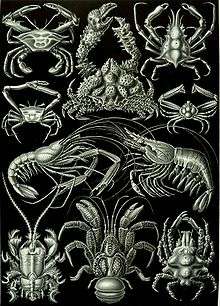
Decapods (Decapoda)
-

Cephalopod (Gamochonia)
-

Fern (Filicinae)
-
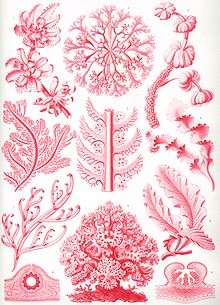
Red Algae (Florideae)
-
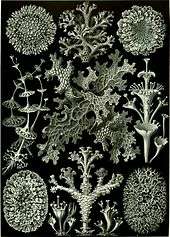
Lichen (Lichenes)
-
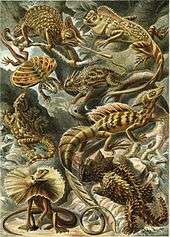
Lizard (Lacertilia)
-

Moss (Muscinae)
-

Nepenthes (Nepenthaceae)
-

Nudibranch (Nudibranchia)
-

Trachylina (Narcomedusae)
-

Orchid (Orchidae)
-

Boxfish (Ostraciontes)
-

Prosobranchia (obsolete classification)
-

Polycystine (Spumellaria)
-

Radiolarian (Stephoidea)
-

Moth (Tineida)
-
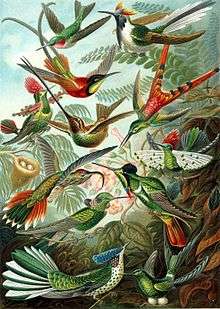
Hummingbird (Trochilidae)
-

Tubularia (Tubulariae)
References
- 1 2 Innes, Shelley (2006). "From Here to Eternity: Ernst Haeckel and Scientific Faith, Religion, Theology, and Natural Science, Vol. 3 by Mario di Gregorio". Journal of the History of Biology 39 (1): 214–216. doi:10.1007/s10739-006-0001-9. JSTOR 4332000.
- ↑ Juliana D. Kreinik; New York University. Institute of Fine Arts (2008). The Canvas and the Camera in Weimar Germany: A New Objectivity in Painting and Photography of the 1920s. ProQuest. p. 232. ISBN 978-0-549-58248-9.
- ↑ Breidbach, Visions of Nature, p. 253
- ↑ Breidbach, Visions of Nature, pp. 229-231
- ↑ Breidbach, Visions of Nature, pp. 231, 268-269
- Breidbach, Olaf. Visions of Nature: The Art and Science of Ernst Haeckel. Prestel Verlag: Munich, 2006.
External links
| Wikimedia Commons has media related to Kunstformen der Natur (all 100 prints). |
- Marine Biological Laboratory Library - An exhibition of material on Haeckel, including background on many Kunsformen der Natur plates.
- University Art Gallery, University of Massachusetts Dartmouth - An Ernst Haeckel exhibition from 2005 pairing prints from Kunstformen der Natur with modern sculptures.
- Kurt Stüber's Biolib - An online version of Kunstformen der Natur with 200 dpi scans of the 100 plates, their scheme plates, the accompanying description, table of contents and supplement pages.
- Ernst Haeckel's 'Kunstformen der Natur' as zoomable images - One hundred plates of "Kunstformen der Natur" (requires flash).
- Kunstformen der Natur


